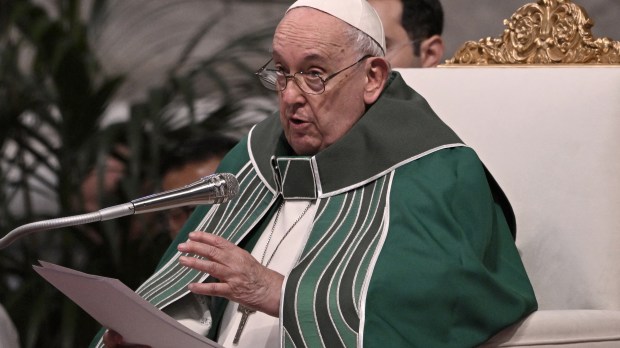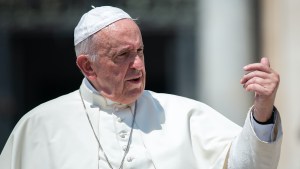Highlighting the “conversation of the Spirit” experienced at the Ordinary General Assembly of the Synod of Bishops, Pope Francis presided over the closing Mass of the month-long gathering. In his homily he recalled how the Synod participants “experienced the loving presence of the Lord and discovered the beauty of fraternity.”
The Sunday morning celebration on October 29 in St. Peter’s Basilica marked the culmination of this first session of the Synod on Synodality looking at communion, participation, and mission. The next session will take place in October 2024.
Here is the text of the Pope’s homily:
~
A doctor of the Law comes to Jesus under a pretext, in order to test him. The question he asks, however, is an important and enduring one that, at times, arises in our own hearts and in the life of the Church: “Which commandment in the law is the greatest?” (Mt 22:36). We too, immersed in the living stream of Tradition, can ask: “What is the most important thing? What is the driving force?” What matters so much as to be the guiding principle of everything? Jesus’ answer is clear: “You shall love the Lord your God with all your heart, and with all your soul, and with all your mind. This is the greatest and first commandment. And a second is like it: You shall love your neighbor as yourself” (Mt 22:37-39).
Brother Cardinals, Bishops and priests, men and women Religious, dear brothers and sisters, at the conclusion of this stage of our journey, it is important to look at the “principle and foundation” from which everything begins ever anew: by loving. Loving God with our whole life and loving our neighbour as ourselves. Not our strategies, our human calculations, the ways of the world, but love of God and neighbour: that is the heart of everything. And how do we channel this momentum of love? I would propose two verbs, two movements of the heart, on which I would like to reflect: to adore and to serve. We love God through adoration and service.
The first verb, adore. To love is to adore. Adoration is the first response we can offer to God’s gratuitous and astonishing love. The amazement of adoration, the wonder of worship, is something essential in the life of the Church, especially in our own day in which we have abandoned the practice of adoration. To adore God means to acknowledge in faith that he alone is Lord and that our individual lives, the Church’s pilgrim way and the ultimate outcome of history all depend on the tenderness of his love. He gives meaning to our lives.
In worshiping God, we rediscover that we are free. That is why the Scriptures frequently associate love of the Lord with the fight against every form of idolatry. Those who worship God reject idols because whereas God liberates, idols enslave. Idols deceive us and never bring to pass what they promise, because they are “the work of men’s hands” (Ps 115:4). Scripture is unbending with regard to idolatry, because idols are made and manipulated by men, while God, the Living God, is present and transcendent; he is the one “who is not what I imagine him to be, who does not depend on what I expect from him and who can thus upset my expectations, precisely because he is alive. The proof that we do not always have the right idea about God is that at times we are disappointed: We think: ‘I expected one thing, I imagined that God would behave like this, and instead I was wrong’. But in this way, we turn back to the path of idolatry, wanting the Lord to act according to the image we have of him” (C.M. Martini, I grandi della Bibbia. Esercizi spirituali con l’Antico Testamento, Florence, 2022, 826-827). We are always at risk of thinking that we can “control God”, that we can confine his love to our own agenda. Instead, the way he acts is always unpredictable, it transcends our thinking, and God’s way of acting consequently demands amazement and adoration. Amazement is very important!
We must constantly struggle against all types of idolatry; not only the worldly kinds, which often stem from vainglory, such as lust for success, self-centredness, greed for money – let us not forget that the devil enters “through the pockets”, the enticements of careerism; but also those forms of idolatry disguised as spirituality – my own spirituality: my own religious ideas, my own pastoral skills… Let us be vigilant, lest we find that we are putting ourselves at the centre rather than him. And let us return to worship. May worship be central for those of us who are pastors: let us devote time every day to intimacy with Jesus the Good Shepherd, adoring him in the tabernacle. May the Church adore: in every diocese, in every parish, in every community, let us adore the Lord! Only in this way will we turn to Jesus and not to ourselves. For only through silent adoration will the Word of God live in our words; only in his presence will we be purified, transformed and renewed by the fire of his Spirit. Brothers and sisters, let us adore the Lord Jesus!
The second verb is to serve. To love is to serve. In the great commandment, Christ binds God and neighbour together so that they will never be disconnected. There can be no true religious experience that is deaf to the cry of the world. There is no love of God without care and concern for our neighbour; otherwise, we risk becoming pharisaic. We may have plenty of good ideas on how to reform the Church, but let us remember: to adore God and to love our brothers and sisters with his love, that is the great and perennial reform. To be a worshiping Church and a Church of service, washing the feet of wounded humanity, accompanying those who are frail, weak and cast aside, going out lovingly to encounter the poor. We heard in the first reading how God commanded this.
Brothers and sisters, I think of the victims of the atrocities of war; the sufferings of migrants, the hidden pain of those who are living alone and in poverty; those who are crushed by the burdens of life; those who have no more tears to shed, those who have no voice. And I think too of how often, behind fine words and attractive promises, people are exploited or nothing is done to prevent that from happening. It is a grave sin to exploit the vulnerable, a grave sin that corrodes fraternity and devastates society. As disciples of Jesus, we desire to bring to the world a different type of leaven, that of the Gospel. To put God in first place and, together with him, those whom he especially loves: the poor and the weak.
This, brothers and sisters, is the Church we are called to “dream”: a Church that is the servant of all, the servant of the least of our brothers and sisters. A Church that never demands an attestation of “good behaviour,” but welcomes, serves, loves and forgives. A Church with open doors that is a haven of mercy. “The merciful man”, said John Chrysostom, “is as a harbour to those who are in need; and the harbour receives all who are escaping shipwreck, and frees them from danger, whether they be evil or good; whatsoever kind of men they be that are in peril, it receives them into its shelter. You also, when you see a man suffering shipwreck on land through poverty, do not sit in judgment on him, nor require explanations, but relieve his distress.” (In pauperem Lazarum, II, 5).
Brothers and sisters, the General Assembly of the Synod has now concluded. In this “conversation of the Spirit,” we have experienced the loving presence of the Lord and discovered the beauty of fraternity. We have listened to one another and above all, in the rich variety of our backgrounds and concerns, we have listened to the Holy Spirit. Today we do not see the full fruit of this process, but with farsightedness we look to the horizon opening up before us. The Lord will guide us and help us to be a more synodal and missionary Church, a Church that adores God and serves the women and men of our time, going forth to bring to everyone the consoling joy of the Gospel.
Brothers and sisters, I thank you for all that you have done during the Synod and for all you continue to do. Thank you for the journey we have made together, for your listening and your dialogue. In expressing my gratitude, I would also like to offer a prayer for all of us: may we grow in our worship of God and in our service to our neighbour. To adore and to serve. May the Lord accompany us. Let us go forward with joy!


